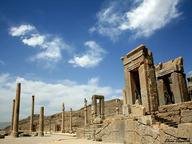Quiz Answer Key and Fun Facts
1. The most detailed source on The Persian Wars is Herodotus. Where was he born?
2. Before invasions it was common practice to demand surrender from cities about to be invaded. What did the Persians demand from Greek cities to signify their surrender?
3. The Ionian revolt was the catalyst for the invasion of Greece. They encouraged the Aegean islands to rise up, which of these islands supported the Ionian Revolt?
4. The burning of Sardis caused Darius to fly into a rage. He swore revenge on the Athenians (ignoring the Ionian troops who actually sacked Sardis), and had his servants repeat to him what words three times each day?
5. Darius's invasion began with a naval battle, defeating the Ionians, Samians and Lesbians. This enabled them to assault with strategically important city?
6. Darius' invasion (under Hippias) culminated in the Battle of Marathon. The Persians chose the battlefield as it allowed them to deploy their cavalry to best advantage. The Athenian army hurried to meet them. Under the command of how many generals was the Athenian army?
7. According to Herodotus what were the casualty figures for the battle of Marathon?
8. As the Persians prepared to launch their next assault on the Greek cities their court welcomed which exiled Greek leader?
9. Xerxes was troubled by a phantom figure which first convinced him not to attack the Greeks, and then tried to persuade him to do so. Xerxes persuaded one of his advisors to dress as him and sleep in his bed to see if the dream would appear to others. Which member of his court, who was opposed to the war, dressed as Xerxes and shared the dream?
10. The first obstacle to Xerxes was crossing the Hellespont. The first bridge built was swept away by the water. What action did Xerxes take to ensure the success of the second bridge?
11. The news of Xerxes advance reached the Athenians who promptly sent to the oracle at Delphi for a prophecy. The first was not to their liking, so a second was requested. The envoys liked the second one better and returned to Athens. The assembled masses focused on two lines in particular 'Yet Zeus the all-seeing grants to Athene's prayer, That the wooden wall only shall not fall, but help you and your children.' What did the masses assume the 'wooden wall' to mean?
12. The Athenians were guided in their interpretation of the prophecy by Themistocles. Themistocles had previously given sage advice to the Athenian assembly regarding what?
13. The Greek states united at the prospect of imminent invasion. They sent out envoys to surrounding cities. The army was assembled, under the command of which city state?
14. The story of Thermopylae is well known. The Persians were eventually led over the pass and to the rear of the Greek forces by which Greek traitor?
15. The story of 300 against a million is rather exaggerated. Not only were there considerably fewer Persians than that, but also the Spartans were not alone. Which other force voluntarily remained behind with Leonidas?
16. The Greek fleet, which was holding at Euboea, heard of the defeat at Thermopylae and retreated in accordance with the Greek plans. It was at Salamis that the major naval engagement was to be fought. Which famous commander caused Xerxes to remark 'My men have turned into women, and my women into men'.
17. Xerxes himself retreated to Persia leaving behind an army to occupy Northern Greece and look to launch an attack on the Peloponnese the following spring/summer. Who was in control of this army?
18. Xerxes was accompanied on the march back by around 60,000 troops (according to Herodotus) under the command of Artabazus. After escorting the king they laid siege to which city?
19. Mardonius moved in the summer and re-occupied a deserted Athens. After an appeal from the Athenians, the Spartans deployed 5,000 Spartiates and 35,000 Helots and Mardonius retreated. A stalemate at Plataea ensured for around 14 days. In the final battle the Persian army of 300,000 was slaughtered. According to Herodotus how many Persians survived the rout?
20. The siege of Thebes followed and the Greek fleet finally caught up with the Persian one at the Hellespont. They found the bridge already broken and prepared to for the final skirmish of the war. This was the battle of ______?
Source: Author
Gimpess
This quiz was reviewed by FunTrivia editor
bloomsby before going online.
Any errors found in FunTrivia content are routinely corrected through our feedback system.


